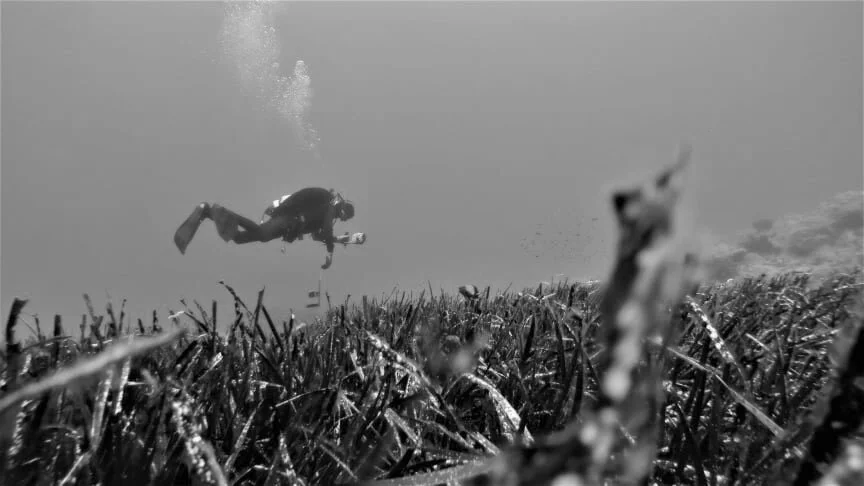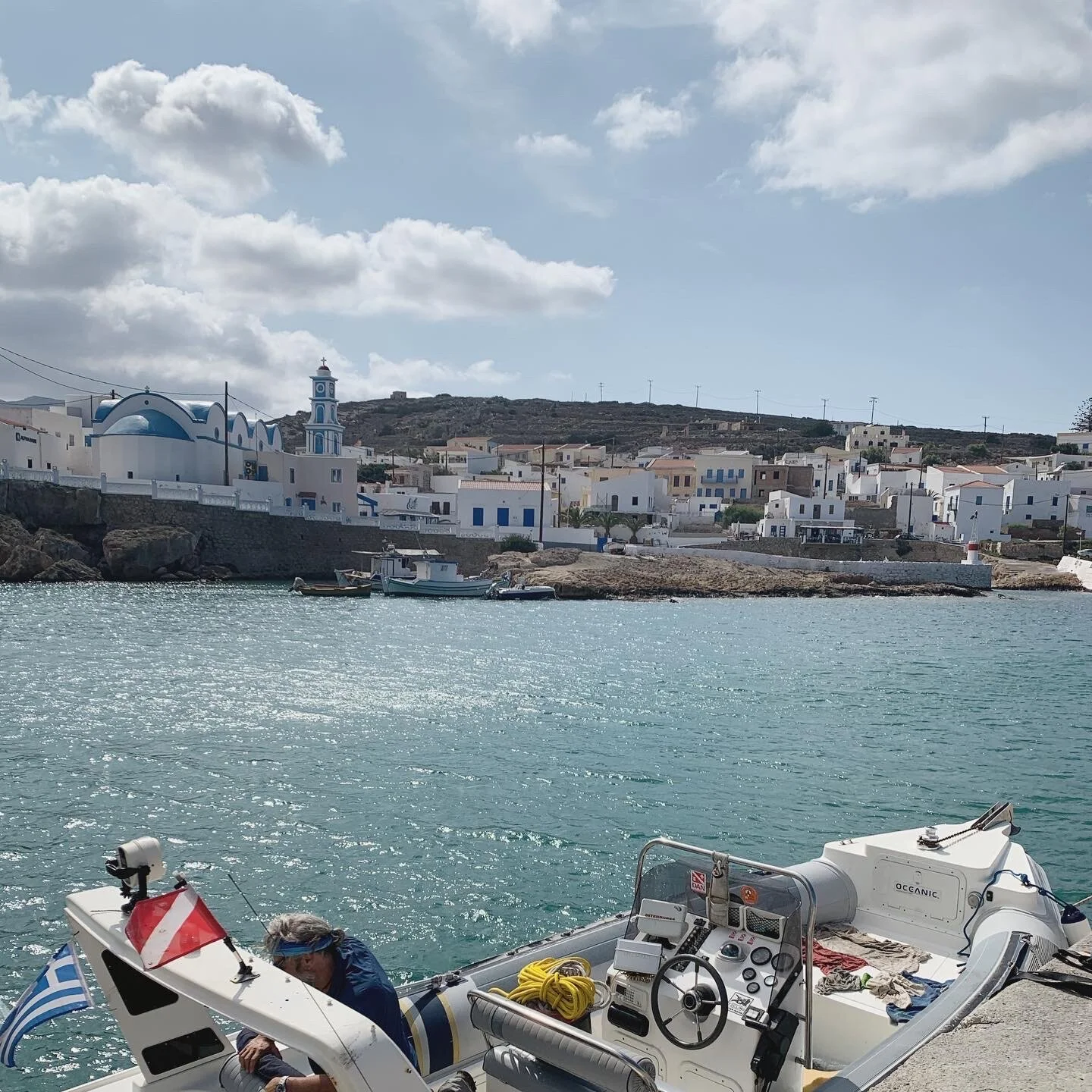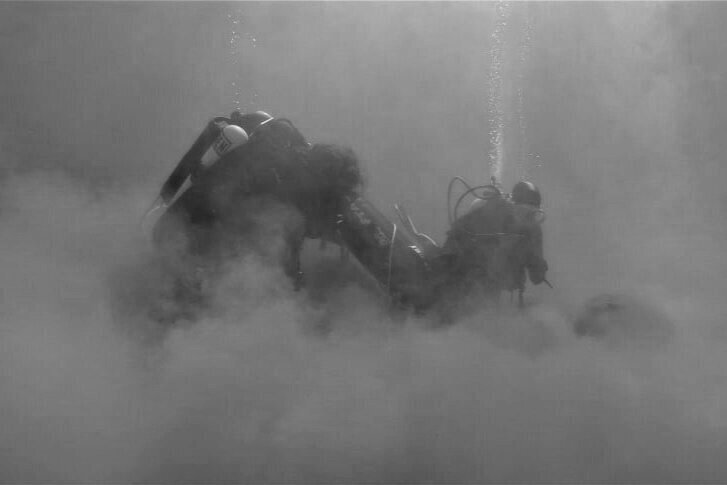Kasos’ Sunken Story
In the warm southern Aegean waters off Kasos, the Kasos Maritime Archaeological Project’s team of divers search the sea floor for clues of the island’s long and partially lost nautical past, hoping to bring it home.
Off the Dodecanese island of Kasos, a team of divers make their way through the coastal Aegean waters, aiming to explore selected areas of interest along coastline. Working against the region’s seasonal winds and strong currents, the team, comprised of diver-archaeologists, architects, technical staff, geologists, oceanographers, and conservators, is determined to make the most of their time here. Meanwhile, at their base camp on the docks of the port of Fri, a map is spread out on a desk borrowed momentarily from the municipality, and several big black pools containing seawater wait in anticipation of any finds brought to the surface.
The arrangement is rather obvious to the local population of just over 1000, who repeatedly make rounds on foot or scooters, in fishing boats or cars. Children press their faces to the windows, and everyone cranes their neck as they pass to see if any progress has been made. But there is nothing to hide; the aim of the project is not to sneakily remove the island’s hidden treasures beneath the noses of the locals. It’s to fill in the suspicious gaps within the history of an island that has, as referenced by Homer’s Iliad, long been associated with the sea.
“And they that held Nisyrus and Crapathus and Casus and Cos, the city of Eurypylus, and the Calydnian isles, these again were led by Pheidippus and Antiphus, the two sons of king Thessalus, son of Heracles. And with them were ranged thirty hollow ships.”
The intensive survey of the Kasos Maritime Archaeological Project is the first attempt to comprehensively explore the long and partially lost nautical past of the island. Director Xanthie Argiris has been working for 4 years to have the project approved and funded in order to fulfil this goal. Although the hope is to find as many clues as possible to connect the dots in the historical record, she formidably emphasises that ‘even no discovery is a discovery’.
A wise and true statement though it is, the survey has been far from fruitless. The waters surrounding the small island are home to several points of archaeological and geological interest, boasting beautiful diving amongst both natural wonders and remnants of the island’s past. Outside of the water, too, Kasos is a lovely place; the paced-down, quintessentially Greek white-and-blue town of Fri is dwarfed by broad mountains that reach the clouds, and on either side of the port, bow down to the vast Aegean sea.
While the academic endeavours of the project will continue throughout another field season in 2021, the discoveries already made offshore of Kasos will be made available to the public in a matter of weeks. Virtual dives, online resources using virtual reality and augmented reality, and more digital media in the works constitute yet another core component of the project’s ultimate goal: not only to reach an improved understanding of the island’s history, but to share it.
Tech-based outreach holds great potential to spread the project far and wide, hopefully drawing more visitors to the small but quaint island. But aside from taking advantage of the world-wide web, a central approach to communicating the project will be to do so right here on the island. Beginning with the younger generations, local outreach is a brilliant mode of enhancing the collective identity, understanding of the cultural landscape, and awareness of the historical past already so deeply rooted within the island’s community. Educational games and resources developed for local children and teachers are a top priority, inviting the youth of Kasos to explore the discoveries made just offshore of their island home. From storytelling the ‘lifetimes’ of local artefacts to flashcards for matching images of them pre- and post-conservation, the resources will be remarkably specific to the island, only strengthening the sense of place, something upon which the Kasians are already clear.
The Kasos Maritime Archaeological Project (@kasosproject) is a joint effort by the National Hellenic Research Foundation, Institute of Historical Research and Ephorate of Underwater Antiquities of the Greek Ministry of Culture, headed by director Xanthie Argiris and assistant director Panagiotis Georgopoulos and backed by a brilliant team. No collaborative project with both broad aims and a comprehensive approach can be achieved without support. These many moving parts are sponsored and supported by Kassos Brotherhood NY, Carlton Hoye, Aquatec, Apnea, Blue Star Ferries, Eurobrokers, Map4U, Hellenic Cables, Revoil, Terna Energy and finally, the Municipality of Kasos, to which the project hopes to give back.





